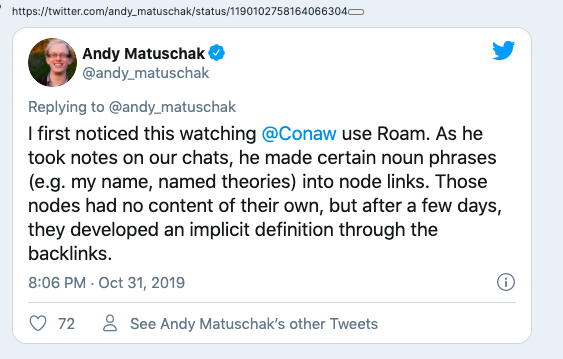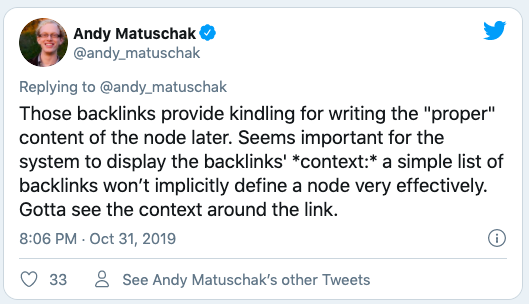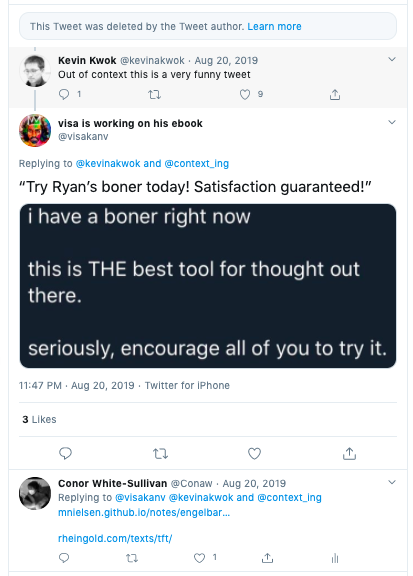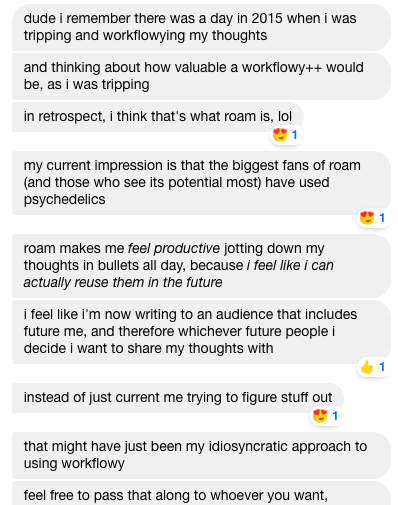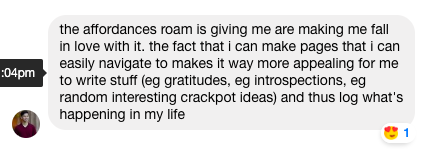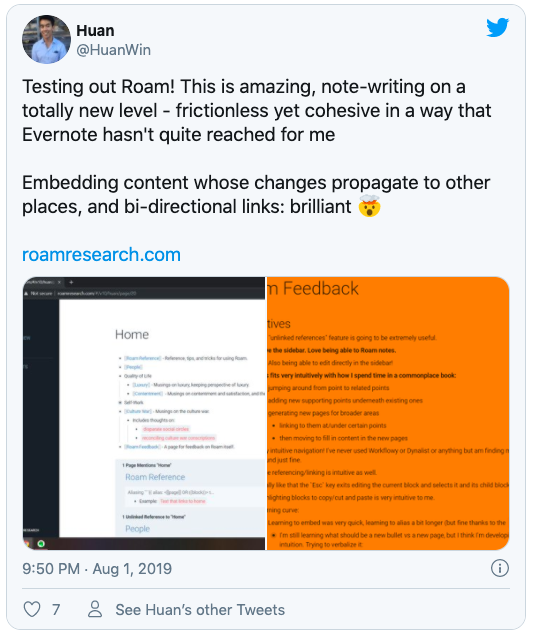Help Garden
Powered by 🌱Roam GardenWhat People Are Saying
- Articles about Roam
- https://twitter.com/RoamResearch/status/1204169194821939200?s=19
- On the concern of Switching costs
- Sam DavisStanford
Roam is the productivity tool that I didn't know I needed
I see it as a productivity map of my brain, showing to me how I organize thoughts in my mind.
it helps me organize thoughts and reduce the clutter in my head. This is something that no productivity or organization tool, including Google Drive and Microsoft Office, has ever offered to me before.
- from
Roam [is] a brilliant new organizational and productivity tool in the form of a web app that is compatible with how the mind actually operates: networked thought. In your Roam account, you essentially build a personal wiki from the ground up with your own pages. You can create bi-directional links to any page and embed content from one page to another, so you no longer need to choose which singular location to put information-- if you put something on one page, you can have it appear on any other page you'd like without manually editing each location. Among other great features, it's like Google Docs in that it automatically saves your work and allows for simultaneous collaboration, it supports Latex, and it has a sidebar where you can open up/edit other pages so you don't lose your spot. The understated feature that I am most excited about actually is the graph view (see below), which is functionally just an overview of your pages, but to me encompasses the essence of Roam. I see it as a productivity map of my brain, showing to me how I organize thoughts in my mind. The reason why I consider this so powerful is because I get instant feedback on the organization of my mind and as such it helps me organize thoughts and reduce the clutter in my head. This is something that no productivity or organization tool, including Google Drive and Microsoft Office, has ever offered to me before.
For me, Roam is the productivity tool that I didn't know I needed. It took about a day of getting used to before I instantly adopted it into my daily regimen. I used to use a combination of written daily planners, Evernote, Wunderlist, Google drive, and Microsoft Office to record my thoughts, tasks, notes, and research. Now I use Roam. Although it's in its early stages and currently developed by only a two person team, it clearly has tremendous potential. I encourage anyone who's never been quite satisfied with their organization tools, especially technically-oriented, scatterbrained researchers like myself, to give Roam a try with an open mind.
- from
- Mansi JainStanford
- Roam has enabled me to stop segmenting and limiting my thoughts before I’ve even fleshed them out. This flexibility has freed me up to write 3x more daily content than ever before
- Sarah Constantin
- "The most exciting piece of software I've yet tried...
A replacement for the essay... has the potential to be as profound a mental prosthetic as hypertext.
- extracted from::
**__the most exciting piece of software I've yet tried.
a replacement for the essay.
when you take notes on something you're reading, you're actually building the logical structure of the text's argument into the notation.
as fast as writing text in a word processor. But *much more structured.*
as profound a mental prosthetic as hypertext.__**
extracted from::
Roam is the most exciting piece of software I've yet tried, and it's still at the prototype stage. Trust me, you want a demo.
What is it? The short answer is "Workflowy meets Google Docs." But really it's a replacement for the essay.
You can make infinitely nested concepts, in a similar bullet-point format to WorkFlowy.
But you can also reference all mentions to a concept. And use inline LaTeX. And a couple other things that make it possible to use this for argument mapping.
So when you take notes on something you're reading, you're actually building the logical structure of the text's argument into the notation.
Because it's mostly keyboard shortcuts, not drag-and-drop, it has the potential to be as fast as writing text in a word processor. But *much more structured.*
At a minimum it allows me to synthesize all my self-tracking techniques (which currently live in WorkFlowy and Google Sheets) into one tool.
But it has the potential to be *way* more. It can be as profound a mental prosthetic as hypertext.
Check it out. Sarah Constantin in Oct 2018 on Facebook https://www.facebook.com/sarah.constantin.543/posts/242611079943317
- extracted from::
- Quotes -- How to Make a Memex from Sarah Constantin
- Roam also has one important feature that nothing else I've used does -- very low friction to making and linking new pages. A memex is only as good as your willingness to use it. If it's clunky to take notes, you won't. So, Roam has keyboard shortcuts for links and indents and other applications (like LaTeX markup!) It also has very rapid loading times, so it's less irritating to use than a word processor or Google Docs. You can add and link pages as fast as you can type.
- Mainly, I use my memex as a personal record of my thoughts. I make pages for concepts of interest, including references to people. ("Memex" has its own page.) On each day's "daily notes", I add links to things I read, my reactions to conversations or things I've read, worries on my mind, drafts of arguments (diagrammed out with heavy use of indents; supporting arguments are threaded beneath the claims they justify) etc. When I mention a concept, I tag the word so it links to the corresponding concept page.
- I've noticed this allows me to think in a more nuanced way. When I don't have to compress an idea to make it easier to communicate with others, I can allow it to have dependencies, exceptions, conditionals...all the sub-clauses that make it hard to fit in a tweet.
- It also allows me to gain more temporal consistency -- more sense of the commonalities between me-of-last-week and me-of-this-week, to remember when I keep coming back to the same thoughts, etc.
- And it has the usual advantages of diaries -- helps me process my emotions, helps me make sense of my thoughts, helps me keep track of my life.
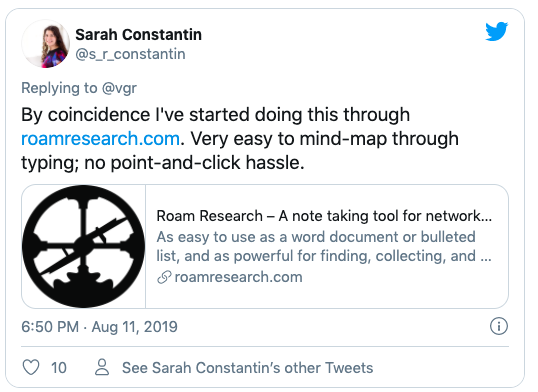
- "The most exciting piece of software I've yet tried...
A replacement for the essay... has the potential to be as profound a mental prosthetic as hypertext.
- Chelsea Voss
The thing that's delighted me most about Roam has been how having it open in a tab affects my entire attitude about research
I feel like I'm playing learning: the video game something I've wanted for a long time.
- extracted from::
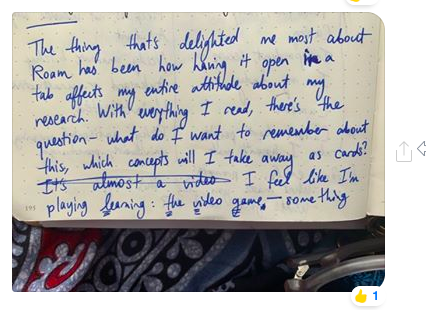
- The thing that's delighted me most about Roam has been how having it open in a tab affects my entire attitude about research. With everything I read, there's the question -- what do I want to remember about this, which concepts will I take away as cards? I feel like I'm playing learning: the video game something I've wanted for a long time. I've only been using it for a few weeks, and I feel it has already accelerated my research on sociology and AI technical strategy that I'm undertaking before starting at OpenAI
- Chelsea Voss - joining OpenAI in September 2019
- Josh
- I like the quote "I feel like I'm playing learning: the video game"
- The thing that's delighted me most about Roam has been how having it open in a tab affects my entire attitude about research. With everything I read, there's the question -- what do I want to remember about this, which concepts will I take away as cards? I feel like I'm playing learning: the video game something I've wanted for a long time. I've only been using it for a few weeks, and I feel it has already accelerated my research on sociology and AI technical strategy that I'm undertaking before starting at OpenAI
- extracted from::
- Anjan KattaStanford
- every little idea and observation otherwise lost into meeting notes is actually salvageable, and filterable by date/person/theme/etc
- extracted from::
Convinced a die-hard notion fan of the power of bi-directional linking
it was amazing seeing the 'oh shit' in his ideas at the power of bi-directional linking
it mean every little idea and observation otherwise lost into meeting notes is actually salvageable, and filterable by date/person/theme/etc
the big idea is slowly spreading....
I was getting goosebumps from when it finally clicked with me in your demo the power of 2 way linking - I think it would change everything in giving us all amazing memories, allowing little things and ideas and suggestions to compound.
what I saw [in the Roam demo] was a capability I was hoping to have for my own learning my entire life.
the little recs or ideas or facts you learn from someone in conversation, could now be saved and compounded and connected so you can come with better ideas going forward..
if it delivers will unlock more productive ingenuity and ideas than basically anything else since Google, wikipedia, 3g.... I'm probably hyperbolizing, but it really doesn't feel like it is.
- extracted from::
- every little idea and observation otherwise lost into meeting notes is actually salvageable, and filterable by date/person/theme/etc
- Luke Miles
- I've been trying different methods of daily writing for five years, and in one month of using roam I'm actually learning something
- Marcin Ignac
- It took me 36 years to find this out and dozen failed “systems” in different apps. Breaktrhoughs: bullet journal in Workflowy, then wiki in Bear, now daily auto-back-linked-wiki interconnected brain dumps in Roam.
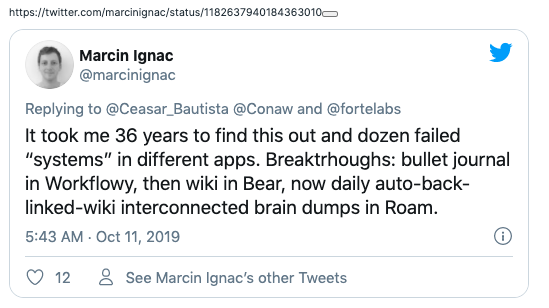
- rewording::
It took me 36 years and a dozen failed "systems" in different apps to figure out that knowledge is organized associatively, not hierarchically. Breakthroughs: bullet journal in Workflowy, then wiki in Bear, now daily auto-back-linked-wiki interconnected brain dumps in Roam.
Marcin Ignac Founder, Variable.io
- rewording::
- https://twitter.com/marcinignac/status/1182737071800307712
- It took me 36 years to find this out and dozen failed “systems” in different apps. Breaktrhoughs: bullet journal in Workflowy, then wiki in Bear, now daily auto-back-linked-wiki interconnected brain dumps in Roam.
- context_ing
- https://twitter.com/context_ing/status/1164038156343099393
- Sadly this is since deleted - lesson learned on fragility of Twitter as an archive - will def need screenshot + text extraction workflow
- Sadly this is since deleted - lesson learned on fragility of Twitter as an archive - will def need screenshot + text extraction workflow
- https://twitter.com/context_ing/status/1161394091457802240
- https://twitter.com/context_ing/status/1164038156343099393
- Shashkes Sarit
[Roam] gives us structure and ability to track tasks without inhibiting our creativity and getting bugged down by endless fields to fill out like Asana or getting lost in overly complex data structures like Notion.
I would highly recommend this for any small start up team or individuals trying to increase productivity
- extracted from::
- For the last few weeks we've been testing a new tool for task management and bug tracking at Radix Motion. We've previously tried Asana and Notion and this works a lot better for us. It gives us structure and ability to track tasks without inhibiting our creativity and getting bugged down by endless fields to fill out like Asana or getting lost in overly complex data structures like Notion. It's called Roam and it's the brainchild of Conor White-Sullivan and Joshua Brown who have been poring a lot of thoughtful work into it over the last few years. They are starting to take on more test users and I would highly recommend this for any small start up team or individuals trying to increase productivity. Looking at the graph overview structure at the end of every day is a pure pleasure for data driven junkies and a great way to self motivate. You can request access on the web site: http://roamresearch.com/
- For the last few weeks we've been testing a new tool for task management and bug tracking at Radix Motion. We've previously tried Asana and Notion and this works a lot better for us. It gives us structure and ability to track tasks without inhibiting our creativity and getting bugged down by endless fields to fill out like Asana or getting lost in overly complex data structures like Notion. It's called Roam and it's the brainchild of Conor White-Sullivan and Joshua Brown who have been poring a lot of thoughtful work into it over the last few years. They are starting to take on more test users and I would highly recommend this for any small start up team or individuals trying to increase productivity. Looking at the graph overview structure at the end of every day is a pure pleasure for data driven junkies and a great way to self motivate. You can request access on the web site: http://roamresearch.com/
- extracted from::
- Anonymous Users
I remember thinking about how valuable a workflowy++ would be... in retrospect, I think that's what Roam is.
Roam makes me feel productive jotting down my thoughts in bullets all day, because I feel like I can actually reuse them in the future.
I feel like I'm now writing to an audience that includes future me, and therefore whichever future people I decide I want to share my thoughts with
instead of just current me trying to figure things out.
- censored version of::
I feel like a Rich Serious Person using Superhuman and I feel like a Serious Researcher using Roam...
Roam is definitely the one true CRM for me forever for whatever the heck noun best describes my networking relationships
Like omg I can finally learn everyone’s names and teams at work
I can finally make my super unstructured lists of interesting people I’ve met at events AND KEEP UP WITH THEM
omg omg omg
My dossiers will pierce the heavens
- Alex Zhu
- Huan Win
- https://twitter.com/ben_r_hoffman/status/1131079009989742593 Conspiracy Theories
- Malcolm Ocean
- @gmws82 and I are starting to collaborate on @CompliceGoals stuff, and we made a slack but are discovering that we basically want to just use @conaw's http://roamresearch.com for everything (...except like, specifically pinging each other to schedule something)
- For an older version
Long Term vision comments
- https://matthewmcateer.me/blog/under-investigated-fields/philosophy-improving-the-iteration-speed-of-scientific-knowledge
- If we want to improve on the iteration speed in scientific research, one of the more promising ways would be to incorporate methods from software engineering. Software engineering has gone from waterfall projects that release updates as standalone monoliths from a closed-source warehouse, to agile-developed remotely-updated differential improvements that may be supported a large community. Academic literature by contrast is still structured as it was in the early days of physical publishing, and has barely adapted (and this is putting it extremely kindly) for tasks such as retractions or sharing data. Citations often do not distinguish between which works are being used as supporting material, which are discredited, which are being supported, or which are being used as examples (positive or negative). The idea of making techniques like revision control, bug-flagging, and dependency management available for scientific research (much like what software engineering uses) is a change I’m definitely in favor of. Some projects are already underway in restructuring scientific knowledge into these kinds of collaborative tools, such as Roam Research or the Polymath Project. Having a scientific literature version of Knowledge Graph would be a far superior alternative to the increasingly bureaucratic review and publishing process.
- If we want to improve on the iteration speed in scientific research, one of the more promising ways would be to incorporate methods from software engineering. Software engineering has gone from waterfall projects that release updates as standalone monoliths from a closed-source warehouse, to agile-developed remotely-updated differential improvements that may be supported a large community. Academic literature by contrast is still structured as it was in the early days of physical publishing, and has barely adapted (and this is putting it extremely kindly) for tasks such as retractions or sharing data. Citations often do not distinguish between which works are being used as supporting material, which are discredited, which are being supported, or which are being used as examples (positive or negative). The idea of making techniques like revision control, bug-flagging, and dependency management available for scientific research (much like what software engineering uses) is a change I’m definitely in favor of. Some projects are already underway in restructuring scientific knowledge into these kinds of collaborative tools, such as Roam Research or the Polymath Project. Having a scientific literature version of Knowledge Graph would be a far superior alternative to the increasingly bureaucratic review and publishing process.
- https://matthewmcateer.me/blog/under-investigated-fields/philosophy-improving-the-iteration-speed-of-scientific-knowledge
- Aka Endorsements
